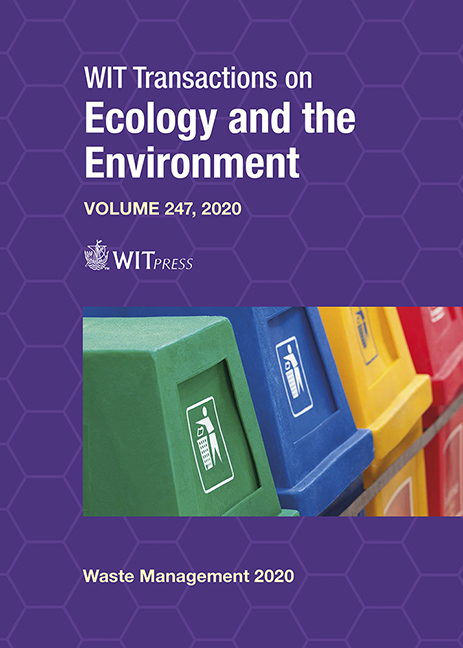WASTE VALUE POTENTIAL ANALYSIS OF MUNICIPAL SOLID WASTE PRODUCED IN THE PERI-URBAN AREA OF ZHAOQUANYING, CHINA
Price
Free (open access)
Transaction
Volume
247
Pages
10
Page Range
25 - 34
Published
2020
Paper DOI
10.2495/WM200031
Copyright
WIT Press
Author(s)
VICKY SHETTIGONDAHALLI EKANTHALU, SAFWAT HEMIDAT, SUSANNE HARTARD, GERT MORSCHECK, MONA-MARIA NARRA, SATYANARAYANA NARRA, JAN SPRAFKE, MICHAEL NELLES
Abstract
The recovering and recycling of municipal solid waste (MSW) plays a most crucial role in sustainable waste management and environmental preservation. The rapid urbanization and migration of people is urging the bigger cities of china to handle significantly higher amount of waste. Likewise, the overdependence of peri-urban regions like Zhaoquanying town (ZQY) on bigger cities is making the concept of recycling and recovery a major challenge and simultaneously causing a higher burden on urban areas for sustainable waste management. In this concern, it is crucial to make peri-urban regions like ZQY self-reliant in their waste management. The current study provides the integration of experimental analysis and theoretical evaluation to determine the waste value potential of the MSW produced in ZQY. The experimental sorting analysis of MSW in ZQY has revealed that the major component of MSW consists of recoverable waste with an average of 28% (kitchen and other organic waste) and recyclable waste with an average of 20% (paper, plastic, and metal). Despite the having a higher amount of recoverable and recyclable waste, all the produced waste in ZQY is currently ending up in the Shunyi central incineration plant without efficient waste value recovery. The experimental analysis from the organic waste in ZQY has proved to have a higher potential in producing better quality methane and compost. The analysed results reveal that organic waste produced in ZQY has comparatively higher value potential than the recyclable waste available in ZQY, and the total estimated value potential of municipal waste produced in ZQY is between 2.93–3.66 million Yuan/year. The outcome of this study will provide policymakers with the first-hand information and reasoning for directing efforts to achieve waste recovery and recycling in their current waste management practice in ZQY.
Keywords
municipal solid waste in China, waste management, waste value, anaerobic digestion, composting, waste recycling





